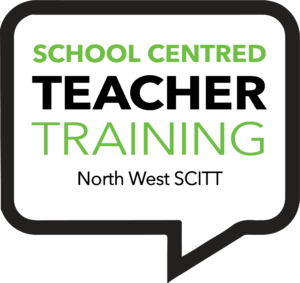How is in-school training different to training at a university?
Unlike university-based teacher training programmes, where you have a number of different placements, our programme allows you to do most of your training in one school. The big benefit of this is that you can put your academic learning into practice in a classroom environment where you feel familiar and comfortable.
You’ll learn through a combination of self-guided learning, face-to-face and online sessions with other trainees. In-school activities will include classroom teaching practice, peer support and one-to-one guidance from your mentor. The practical teaching experience you gain will mean you finish the training confident to teach in a classroom.
You will also have a dedicated mentor – an experienced teacher – throughout your training who works alongside you in your school to offer guidance.
What is a SCITT? What is QTS? What is a PGCE?
A SCITT an organisation or an alliance of schools who are accredited by the DfE to train student teachers. At the end of their period of training, the SCITT can then recommend them to the DfE for award of Qualified Teacher Status (if they meet the necessary standards).
QTS (Qualified Teacher Status) is awarded by the DfE to students who have undertaken an Initial Teacher Training programme via a SCITT or HEI and is the required status to teach in England and Wales.
A PGCE is a postgraduate qualification, awarded by a Higher Education Institution to students who study at postgraduate level. A PGCE is not a qualification to enable you to teach, it is a qualification to demonstrate academic study at L7.
At NorthWest SCITT, all students are enrolled on an ITT programme towards the award of QTS. Those interested in a PGCE may undertake this via our partnership with Liverpool Hope University.
Requirements:
What are the Academic Entry Requirements?
GCSE – Standard equivalent to grade 4 (C) in English Language, Mathematics and a Science subject. Alternatively, an Equivalency from a recognised HEI for entry to ITT.
Note – Key and Functional skills at Level 2 are not equivalent to GCSEs
Degree – A first degree from a UK Higher Education institution. The first degree can be classification of first, 2:1, 2:2 or a degree comprising of 300 HE credit points of which 60 must be at level 6 of the QCF.
What are the Professional Entry Requirements?
All successful candidates are required to meet the following conditions of offer by the programme start date:
- Clear Disclosure and Barring Service (DBS) criminal records check including children’s barred list information;
- Clear Prohibition order check;
- Clear Health and physical capacity to train to teach through an external occupational health check;
- Clear criminal record checks for overseas applicants;
- Clear criminal records checks for applicants who have lived or worked abroad 3 months or more in the last 10 years;
- 2 Professional references.
Applicants with Disabilities or Special Educational Needs:
We comply with equality legislation and ensure that the interview procedures promote equality of opportunity and avoid discrimination.
Applicants with disabilities are under no obligation to disclose their disabilities. However, where information is provided we can make adjustments to promote equality of access for disabled applicants

What will I study?
Your study will focus on exploring how children learn; planning teaching and assessment strategies; national statutory frameworks, and theories in relation to behaviour for learning.
You will be trained in how subjects are taught in schools, how teachers monitor progress and outcomes across Key Stages, effective use of computing in classrooms and using the environment to inspire and challenge children.
We will develop your theoretical and practical understanding of how to meet the needs of all children, including those with SEND (Special Educational Needs and Disability), EAL (English as an Additional Language), challenging behaviours, children from minority ethnic backgrounds, children with disabilities as well as children who are able and talented.
For those who wish to undertake the additional element of PGCE, your study will focus on modules as identified within the modular options available by Liverpool Hope University to link to your personal needs/interests.
How will I study?
For those following the QTS pathway you will study in a range of interrelated ways across the duration of the training period including:
- Centre-based training led by experts in their field/subject;
- Completion of nationally accredited modules and online learning;
- Participation in collaborative learning experiences in pedagogy tutorials;
- Participation of focused lesson visits of classroom teaching and learning, delivered by experienced, qualified teachers;
- Engagement in school-based training, guided and supported by age phase expert mentors;
- Deconstruction of learning in school-based training experiences delivered by school-based experts;
- Personalised coaching including instructional and solution-focused coaching, to support the development of your personal competencies;
- Completion of directed or self-directed reading or research which is linked to aspects of your training;
- Undertaking personal research and preparation for your own curriculum delivery or competency development in the classroom.
For those who wish to undertake the additional element of PGCE, you will study this through Bath Spa University’s face to face sessions and their virtual learning platforms. As well as this you will be supported in your academic writing by academic study tutors.
How many training placements are there?
Training ‘on the job’ and ‘in situ’ is the backbone of our programme and you will train in schools for the equivalent of 4 days each week. You will be engaged in training experiences for the equivalent of 1 day each week.
You will complete two x 18 week professional training placements in at least two contrasting schools. This allows all trainees to gain sustained, long term teaching experience in each of the two identified key stages, preparing you to be classroom ready in what ever key stage you secure your first post in!
In addition you will complete Enhancement Placements in phases before and after your specific route to develop your knowledge of curriculum progression and transition.
Further opportunities may be provided for you to gain invaluable experience in special educational needs schools, schools with a high percentage of children with EAL or small rural schools.
How will I be assessed?
You will be assessed in an ongoing manner in a number of ways including:
- Initial assessment during the selection process, to establish your ‘suitability to teach’ with post-interview targets to support a smooth transition to your ITT programme;
- Initial assessment during the pre-programme period of your Fundamental Skills in English and Mathematics;
- Formatively (generally each week) by mentors of your growing knowledge and skills in classroom-based contexts via reviews of your teaching and children’s learning;
- Formatively (generally monthly) via collaboration between mentors and programme team in relation to the development of your knowledge and classroom skills (know about and know how to);
- Summative Pit Stops and End of Placement Reviews during and at the conclusion of Training Placement 1 and Training Placement 2;
- Summatively at the end of the ITT programme, against the Teachers’ Standards and entry to ECT framework.
What qualifications do I gain?
On successful completion of the programme you will gain Qualified Teacher Status (QTS), enabling you to to take up a teaching post in either Primary (Key Stage 1 and Key Stage 2) or Secondary (Key Stage 3 and Key Stage 4).
For the primary route your training age phase will be 5-11.
For the secondary route your training age phase will be 11-16.
